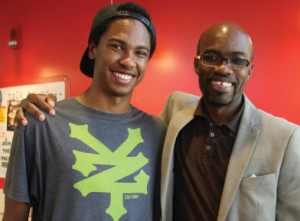
Nagash Clarke’s two-week STEM summer camp is like an electric shock for unsuspecting middle and high schoolers.
Every day from 8:30am to 3pm, students undertake a variety of exciting topics including designing a package meant to keep an egg intact when dropped from three stories high, a tour of the University of Michigan’s biology, engineering and chemistry campuses, a workshop on test anxiety, meeting professionals from the science and health care fields and creating skits showing how they can handle difficult life decisions—just to name a few.
The program is open to any interested students, though many are minorities from Ann Arbor and Ypsilanti. “My main goals are to get the students to see themselves in science careers, and also to improve their core academic skills,” Clarke said. “A lot of adults got into their careers because someone told them, ‘You’d be good at this.’ And they believed them, took it to heart, and embarked on a career.”
As for teaching students how to handle difficult life issues, Clarke says: “They’re being exposed to this stuff, so we might as well address it.”
Perhaps the most notable effect that the program brings to students is shown by their scores on the Compass test—a test used by colleges, including WCC, to assess a student’s college readiness in math, reading and writing. Most of the students in the camp dramatically improve their scores by the end of the two weeks. Clarke estimates 90 percent go from scoring “below college level” to scoring “college prepared” in one subject area or more when they take the test again at the end of the camp.
Kristin Brandemuehl, interim dean of math and natural sciences, visited the camp and saw the students’ final presentations, during which they were dressed in business professional attire and had been prepped in public speaking. “Those presentations were substantive,” she said. “The students clearly had learned a lot of things: technology skills, science fundamentals, composure. I was impressed with their interest and energy level too.”
Brandemuehl was also impressed by Clarke. “His enthusiasm and dedication to bringing kids in is really amazing. I was so inspired by his passion for the camp. It’s a lot of work, and it takes a whole different energy and mindset to work with middle and high school kids. For two weeks he digs in and he’s an amazing role model.”
Isaiah Mahler attended the camp when he was a junior at Ypsilanti New Tech Nigh School two years ago. He’s now earning his Liberal Arts Transfer degree at WCC, and he plans to study neuroscience and artificial intelligence at a four-year university. He said Clarke’s STEM camp made him feel prepared to handle college.
“It was really helpful, and it was fun too,” Mahler said. “It really helps kids who are not ready for college get ready in just two weeks.”
The camp has been running since 2011, and it has been funded in large part by a grant from DTE Energy.
“This kind of camp, running nearly an entire day and providing field trips and food, could easily cost a few hundred dollars per student,” Clarke said. “With the grant, we only charge students $50. We want to be sure students who need the program can have access to it, so we are really appreciative to DTE. We’re not looking to make money, we’re looking to help students achieve and find themselves—that’s all we want for them.”
